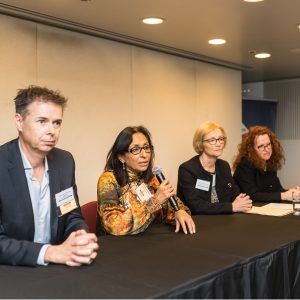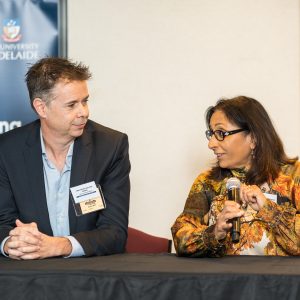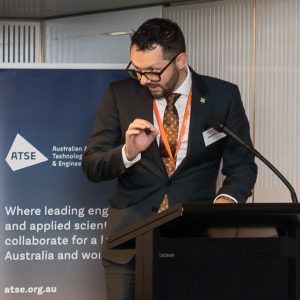Australian legislators must grapple swiftly with the implications of the recent explosion in generative AI tools like ChatGPT – or miss an historic moment to shape these transformative technologies, secure our sovereign capability and leverage huge economic opportunities.

Rapid strides are needed to safeguard Australia's hugely-valuable large-scale datasets under Australian ownership and limit their use only for the public good, and to ensure current privacy, security, copyright and data ownership legislation is fit-for-purpose.
The calls from leading Australian AI experts came in a briefing for the Parliamentary Friends of Science today organised by Science & Technology Australia for the group's Co-Chairs Karen Andrews MP and Deputy Prime Minister Richard Marles.
3AI Institute Director Distinguished Professor Genevieve Bell said the current moment in history was akin to the window in time between when Tim Berners-Lee published his pivotal paper outlining the concept for the internet and when Google designed its business model.
"And if we knew we were sitting in that moment in time, and we had all of the knowledge of what we didn't do to regulate the internet and to regulate search [engines] and social media, and you got to have the next moment when you were sitting at the beginning of the next massive transformation … what would you do as a regulator?" she asked.
Australian Institute for Machine Learning Director and Amazon Director of Applied Science Professor Anton van den Hengel warned Australia urgently needed to invest to expand frontier AI capabilities in our country to seize control of our own economic destiny.
He likened the moment to the transformative economic inflection points in history like the development of electricity, the internal combustion engine or steam-power.

"We need sovereign capability (in AI) because at the moment, we are largely a place where other countries come to collect data … We can't sit by and download it or wait for other people to deliver it to us. We have to develop this ourselves," he said.
"We (must) actively grab onto this with both hands and drive it right now … it's not in a couple of years given the rate of change."
Deakin University's Applied Artificial Intelligence Institute (A2I2) Co-Director Professor Svetha Venkatesh said AI was now being used in leading Australian firms to accelerate the rate of industrial product development 10 or 20 times faster than ever before.
She cited examples of AI teams working with cutting-edge Australian battery startups companies to develop new technologies faster, with less waste and better functionality.
"Large language models come in because they act as the engineering manual that these algorithms can consult … then the acceleration we will provide will not be 10 or 20 times faster but 50 or 100 times faster which will be truly revolutionary."
"In Australia, our small and medium industries need to build fit-for-purpose types of AI so they can remain resilient, design products faster, and adapt to supply chain disruptions faster," she said.
"If we don't do that, our industry will just get out-competed. No-one is going to wait for us."
Monash Data Futures Institute Director Professor Joanna Batstone said big tech giants overseas were now investing vast amounts of money to propel the development of AI technologies – and Australia needed to take note.
She said ChatGPT "had fuelled a different level of energy in the conversation around AI … both from (an opportunities) and a risk and challenges perspective".
"For Australia, we need to have a seat at the table in the discussions around big tech … and around the opportunities, because otherwise the risk is that the investments being made in the core technologies are being made overseas and that gives us geopolitical risks if we were to be cut off."
The panel also highlighted the energy consumption of AI, with large amounts of electricity and water required to power the technology, and an urgent need for Australia to grow its AI-skilled workforce to keep pace with global developments in this key technology.
And it drew attention to the rise of 'deep fakes', telegraphing an urgent need to safeguard trust in our democratic institutions as these new tools emerge at scale.

Parliamentary Friends of Science is a cross-party group of MPs and Senators passionate about how science and technology can solve some of Australia's most complex challenges.
Parliamentarians were welcomed by Co-Chair Karen Andrews and Rob Mitchell (Chair of the House Standing Committee on Industry, Science & Resources) representing Mr Marles.
Attendees included Shadow Minister for Science Paul Fletcher, Labor's Lisa Chesters, Sally Sitou, Julian Hill, Linda White; the Coalition's Aaron Violi, Jenny Ware and Dr Anne Webster; and Independent MPs Zoe Daniel, Kate Chaney, Monique Ryan and Allegra Spender.
The event was supported by the key named sponsor, the Australian Institute for Machine Learning, and by the Academy of Technological Sciences and Engineering.






